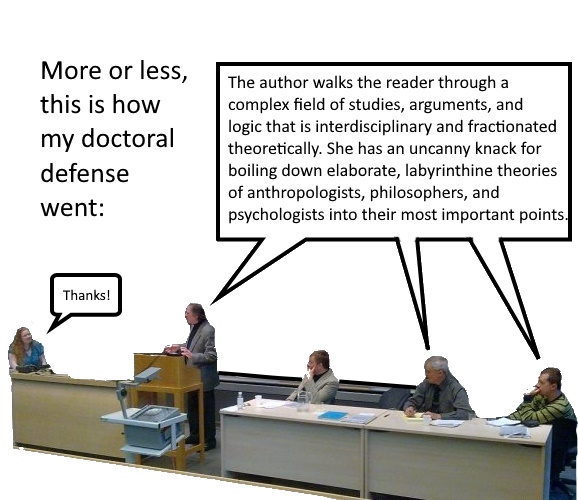About Dr. Gretchen Koch

Hi. I’m a writer, artist, and designer.
I’ve written variously as a student, journalist, blogger, cartoonist, tech writer, board secretary, book reviewer, copywriter, essayist, lecturer, and once wrote up an entire doctoral thesis. I don’t usually go by “Dr.” since I’m out of academia, but I draw heavily from that experience nearly every day, along with all of the others. My goal as a writer is to make complex information accessible for a broad swath of audiences.
A list of my FAQs:
Q: What on earth is your degree in?

A:
The TL;DR:
My doctorate was on the cognitive origins of belief in souls, in the sense of an invisible, non-corporeal essence of a human which is the locus of responsibility (“free will”) that distinguishes humanity from the world and its other occupants. I argued that it’s intuitive to attribute immaterial agency, and that these intuitions shape our perception of the moral behavior of ourselves and others.
For example, moral disgust has been called the “body and soul emotion” because disgust stems from a revulsion to befoulment (uncleanliness, impurity) as well as reminders of our uncomfortable similarity to other animals– in life and in death.
The relationship between these intuitions and our ability to empathize was my primary focus, specifically how they can inhibit our impulse to understand the perspectives of others and participate in their emotional experiences.
An egregiously harmful act encourages attribution bias, which “switches off” empathy through moral essentialism. That’s where you see people branded as demonic, criminal masterminds, or otherwise irredeemable, because nothing in their circumstances exculpates them from this act. They are criminal to the core, and there can be no rehabilitation. Lock them up and throw away the key. See, for example, much of the American criminal justice system.
That’s what I tend to think of as the the inability or refusal to empathize with an individual.
With a group of people, we see moral disgust enter in. As a population, they are branded as animals, vermin, parasites. In this case the group is viewed as inhuman or subhuman, with the implication being that they have no souls. No tug of empathy is felt by the viewers who look, but find nothing similar or familiar in what they see. See, for example, how American Republicans talk about immigrants from.
This was fascinating to learn about, though somewhat predictable territory in terms of the trajectory I was expecting for the thesis.
But then this line of research led me to places I’d never expected, such as how babies learn declarative pointing, and take part in joint attentional scenes as a means to interact with a parent by mutually agreeing that the thing over there with lots of hair is called a “dog.” The declarative pointing is the baby saying “Look at this thing over here,” and the parent confirms “Yes, I see it, and it’s called a dog.” “DOG!” the baby declares again, but verbally this time. This is a critical part of language development, and it happens because a baby and parent agree to aim their attention beams at one thing at the same time, invisibly attaching the symbol “dog” to the small hairy being on the sidewalk.
Yep. Symbols, the foundation of all language, are as basic as “thing standing for another thing with no observable connection.” “F” sounds like “ffffff,” looks like a shepherd’s hook, and begins a word to describe an amphibian in cartoon form (i.e. a representation, not a symbol) on the side of a cereal box. Why? No reason!
And that’s the point– humanity, through our shared immaterial experience known as “culture,” decided to attach an invisible component of that culture to a little squiggly mark in a particular shape. So, what if a person has an invisible component arbitrarily attached to a particular shape (that we call the body), and the invisible component (that we call the soul)? Wouldn’t that make it a symbol that stands for being you?
Psychologist Jesse Bering (over on the right in the photo above, wearing the striped sweater) was on my examining committee because of his research on intuitions about death and the soul as a kind of existential necessity, a virtually unavoidable conclusion.
You can’t imagine what it’s like to be dead– that’s a pretty undeniable cognitive constraint, and yet I can’t think about my father, who died in 2021, without imagining him doing something. Saying things, feeling things. Is it any wonder that the vast majority of humankind believes that some immaterial aspect of a person continues on, long after the body’s atoms have been distributed elsewhere in the universe, attending to different matters altogether?
Anthropologist Stuart Guthrie (sitting next to Jesse) was on my examining committee because of his theory of religion as systematized anthropomorphism– the attribution of human characteristics to non-human things. The flip side of animal reminder disgust, which I mentioned above, is this attribution. We make animals sympathetic by depicting them as like us. We perceive ourselves as empathizing with them cognitively in the way that we do with other humans, which can lead to some incorrect conclusions but tends to work out well for the animals in question.
It’s not just animals, however– Guthrie’s book Faces in the Clouds describes how we anthropomorphize the universe itself. Pareidolia is the term for our tendency to perceive patterns where none exist, usually visual patterns like those faces. But you couldn’t base an entire religion around “I see a face in that cloud,” and that’s just one aspect of the model that Guthrie proposed, which is fundamentally about religion as an explanatory device– a means of interpreting what happens in the world by ascribing some kind of agency to it. Q: Why did that happen? A: Somebody must’ve meant for it to happen. Who was it, and what were they doing– and is it my fault? Is it yours?
Sometimes we can see that “somebody,” but often we can’t. And when the “somebody” is big enough to be the basis of all meaning, you find yourself right back in the existential soup where nothing in life is meaningful unless it all is, and that meaning comes from somewhere outside of ourselves.
So, umm, yeah. In answer to your question: souls, invisible agency, moral responsibility, disgust, and empathy. I’ve never been great at elevator pitches.